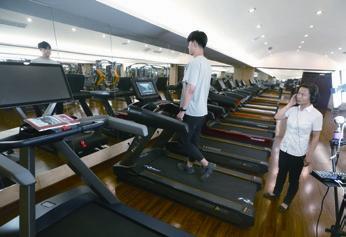Digital Impetus
By Li Xiaoyang
Guangzhou Dayun Motorcycle, a motorcycle maker based in Guangzhou, Guangdong Province in south China, has attended the twice-yearly China Import and Export Fair, also known as the Canton Fair, for 30 years, but this year it was different. For the fi rst time in its 63-year history, the 127th trade fair was not held on-site in Guangzhou due to the novel coronavirus epidemic but online from June 15 to 24 instead.
As Wu Peiyuan, general manager of the international trade department of the company, told a press conference held in Guangzhou on June 21, domestic suspension of work earlier this year and the global pandemic spread affected the companys overseas orders over the past months. However, the fair has brought new opportunities and boosted market confi dence in the recovery of global trade. “As of June 21, we have received more than 30 orders from customers in 18 countries along the Belt and Road route,” he said.
The Canton Fair has long been a platform for enterprises in China to explore the market abroad. While many international exhibitions were canceled due to the pandemic, China held the fair online where merchants used livestreaming to present their products. According to organizers of the fair, it included 50 exhibition sections covering 16 categories of commodities, and attracted some 25,000 Chinese exportoriented companies, showcasing 1.8 million products and services through photos, videos and 3D formats which help connect suppliers and purchasers.
Foreign buyers were allowed to register on the 24-hour live-streaming platform and start purchase negotiations at any time during the exhibition. All companies were exempted from paying exhibition fees.
The fair provided an opportunity for foreign trade enterprises to explore digital transformation with the help of booming new technologies including cloud computing, big data and artificial intelligence, Xie Weien, chief operating officer of Guangzhou-based Light Magic Co. Ltd., which developed online booths for the fair, told Shenzhen Special Zone Daily.
Li Jinqi, Deputy Director General of the organizing committee, said around 72 percent of the enterprises participating the exhibition at this years Canton Fair were from countries along the Belt and Road. The number of participating enterprises from poverty-stricken counties in China totaled 1,318, up 62.3 percent year on year.
“Amid the impact of the epidemic, weak global demand and rising downward pressure on Chinas economy, the fair can help foreign trade enterprises retain international market share and boost the global market outlook,”Li said.
Switching to online
Driven by the resumption of work and production amid virus containment measures since late February, Chinas economic recovery has backed up the Canton Fair this year. Through shifting online, it has continued to meet demands of overseas buyers and allowed domestic enterprises to ensure orders and expand market share.Li Xueliang, a staff member of Jiangmen POSI Refrigeration Appliance, an air conditioner maker in Jiangmen, Guangdong, told Nanfang Daily that many consumers in Europe and the United States had to stay at home due to the pandemic, which has pushed the sales of air conditioners higher over the fi rst four months of this year. “The online fair has enabled our company, which receives 80 percent of its orders from overseas, to expand international business,” she said.
According to her, European buyers showed interest in purchasing about $2 million worth of its mobile air conditioners during the trade fair and negotiations on purchases have already started.
Although not all companies are as lucky as the air conditioner maker given uncertainties in the global market, many export-oriented enterprises in China have tried to turn the challenges into opportunities through shifting to the domestic market and cross-border e-commerce platforms and adopting digital modes.
Zhejiang Pujiang County Shengkai Textile Factory is a merchant on DHgate.com, a Chinabased small-scale cross-border e-commerce marketplace. Zhang Tiantian, sales manager of the company, said the epidemic has caused a drop in the number of large orders. “To cope with the situation, we have switched to seeking small orders and attracting small businesses through DHgate.com to tap into global opportunities during the fair.”
Shenzhen Mondial Technology Co. Ltd., a manufacturer of massage devices based in Shenzhen, Guangdong, conducted live-streaming from its workshops to demonstrate devices 24 hours a day during the fair.
“It has become a trend for companies to shift offl ine businesses to online platforms. We have taken this opportunity to improve our portal for cross-border e-commerce and will focus more on boosting online sales,” Chen Zixin, sales director of the company, told Shenzhen Special Zone Daily.
However, while proving feasible, online exhibition is yet to reach the level needed to become a dominant mode. Zeng Jiaxin, Vice President of Tencent Cloud, told Southern Metropolis Daily that offl ine fairs cannot be fully replaced because buyers fi nd it diffi cult to trust products without an on-site experience and enterprises face challenges in going digital.
Pan Helin, acting dean of the Digital Economy Institute at Zhongnan University of Economics and Law, told Beijing Review that the adoption of new technologies can enhance effi -ciency and security of the fair, but the problems associated with protecting intellectual property rights and data security as well as identifying qualifi ed products remain to be addressed.
Stabilizing trade
Besides helping enterprises retain market share in developed countries, the Canton Fair this year focused on business expansion in the Association of Southeast Asian Nations (ASEAN) and the Belt and Road markets. Zhang Li, Deputy Director General of the Department of Foreign Trade under the Ministry of Commerce(MOFCOM), said at the press conference on June 10 that buyers from the Belt and Road markets have accounted for 45 percent of total buyers at the annual event in recent years and the fi gure will continue to grow.Trade between China and emerging markets has been a highlight in the overall sluggish global trade performance over the past months. Although Chinas foreign trade in goods dropped by 4.9 percent year on year in January-May, its trade with ASEAN went up by 4.2 percent year on year to 1.7 trillion yuan($241 billion) in the period, accounting for 14.7 percent of its total foreign trade. Trade in goods with Belt and Road countries also rose 0.9 percent year on year in January-April, data from the General Administration of Customs of China shows.
The fair has also served as a platform for overseas enterprises to continue to tap into the Chinese market in a convenient way. Boy Chua, Chairman of Sin Sing Coffee in Malaysia, told the fairs organizing committee that the company showcased 30 products on the offi cial website of the fair, including black and white coffee, white milk tea and malt chocolate drinks. It focused on exploring the Chinese market and improving the reputation of its brand and products this year through the fair.
“With 10 years of development, China has become our largest overseas market. Due to the large potential of the Chinese market and strong demand for high-quality imported products, our company still has much space for growth,” Chua said.
Thanks to a gradual economic recovery and an appealing market, Chinas foreign trade growth has picked up. However, Zhang Li stressed that the trade recovery is still facing uncertainties due to slack global demand.
To support foreign trade enterprises, the Chinese Government has increased the number of cross-border e-commerce trial zones to 105 and exempted taxes on some exported goods.
According to Pan, foreign trade enterprises operating in the low and middle end of the industrial chain have been greatly affected by the pandemic. Therefore, they should focus on improving the value of their products and adopt cross-border e-commerce channels to expand markets.

